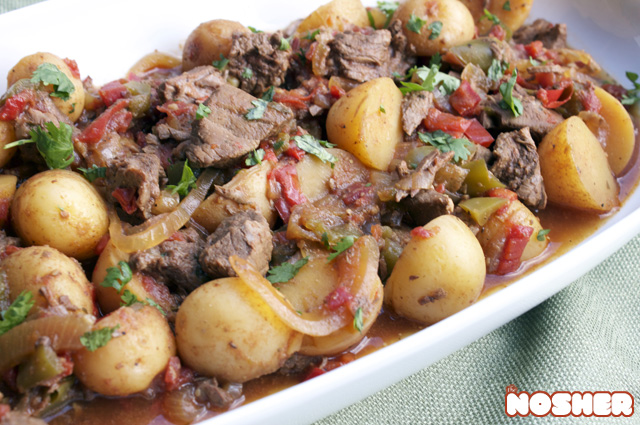As the founder of lifestyle company Nourish Co., Kristin Eriko Posner helps people connect to their lineage. She makes recipes and modern Judaica that incorporate her own Japanese and Jewish backgrounds. With innovative and delectable eats like mochi latkes and brisket with Japanese barbeque sauce, Kristin’s creations make real the possibility of a new dimension of Jewish-Asian identity—one that can exist in cohesion.
In an interview for LUNAR: The Jewish-Asian Film Project, Kristin told me that as a Nisei and Yonsei (second and fourth generation Japanese American) woman, she feels like her culture was “lost on its way to [her].” Her father grew up in Hawai’i post-World War II and quickly assimilated into American culture. Her mother was raised in post American occupation Japan, in a port city where Western films and culture were often romanticized.
Although having her kids go to Japanese school on weekends was important to Kristin’s mother, she didn’t maintain an extensive immersion of culture on a daily basis in their household. Kristin’s family primarily spoke English, and food was the main way her mother connected with her children and their Japanese identities.
“Food is such a gateway to a culture, especially when you live in a diaspora,” Kristin explained. “It’s also a love language.”
But she’s always had a longing for Japanese culture beyond food. This desire drove her to live in Japan for two years after college. In Japan, she learned how to cook family recipes from her aunt. Wanting to find a connection to Japanese culture in her own unique way, she also became a student of Japanese tea ceremony after returning stateside. With her background in interior design and love of art, tea ceremony became the perfect way for her to reclaim her heritage, even though it wasn’t part of her upbringing.

Performing the Japanese tea ceremony. (Nicole Morrison)
“I had this guilt about learning things that were new to me or my family,” Kristin said. “But now looking back, I feel like everyone has every right to take a part of something that is in their heritage and reclaim it for themselves, even if it wasn’t something that was practiced in their families.”
This commitment to the reclaiming one’s heritage is also what inspired Kristin to found Nourish Co. She and her husband, Bryan, are both Jewish, but he grew disconnected from Judaism after Hebrew school.
“When I met Bryan, I was really curious about his background and really inspired by it,” Kristin shared. “I think especially because he doesn’t feel as connected to his Jewish background, I felt this really strong responsibility to carry on the tradition for his family.”
Kristin fell in love with Judaism’s encouragement of questioning. She chose Judaism because of an “indescribable feeling of belonging” she felt in her soul to the Jewish people. As she was becoming Jewish, she also wanted to create new traditions that reflected her and Bryan’s dual Japanese-Jewish culture.
“I think when we as a couple talk about creating our own traditions, that excites [Bryan] more than me saying ‘I want to do everything exactly like your grandmother did it,” she said. “I think he feels really excited that we can create something new together. It’s actually been fun for him to update our rituals. I don’t think that was something he really associated with Judaism.”
Having fun with it, to Kristin, is a huge part of updating traditions. There can be a sense of fraud syndrome, especially as someone coming into a Jewish family where rituals and foods have been passed down for generations. But since Bryan’s family didn’t feel particularly attached to doing things exactly how they had been done in the past, she felt more welcomed to change things up.
“If his family were more rigid about their traditions, I would feel more hesitant to introduce new ones.” Kristin said. “So I feel it’s almost given me some permission in a way.”

Carrying the Torah at Congregation Emanu-El in San Francisco. (Nourish Co.)
Even though his family was open to her new interpretations, Kristin still prioritized being thoughtful and respectful about how to incorporate them into her family’s practice.
“I think it’s really important to understand the history of traditions before you start making changes,” Kristin said. “I don’t think you need to delve into thousands of years and understand every facet, but it’s really important to honor and respect that history while updating.”
Finding a balance between paying homage to history and bringing in new meaning is tied to Kristin’s own Jewish journey as well. For Jews by Choice like her, there can often be a pressure to “do Jewish” perfectly right from the start.
“I didn’t grow up going to synagogue. I don’t have an entire lifetime of learning, going to Hebrew school,” she shared. “Judaism is thousands of years old, and I was expecting myself to learn everything in a couple of years.”
This pressure to “know everything” was alleviated when Kristin’s rabbi, Rabbi Ryan Bauer of Congregation Emanu-El in San Francisco, assured her that the beit din (religious court) was just the beginning, not the end, of her journey. Her learning had just begun, and there was plenty more time to grow into Judaism.
Perhaps not feeling tethered to representing thousands of years of history gives Kristin the creative agency to inspire her own unique traditions.
“Coming across my work, I hope that more people find the freedom to update their traditions,” Kristin said. “I really truly believe that’s what our ancestors have done since the beginning of time anyway. We’ve always kept our traditions alive by adapting to modern time.”







